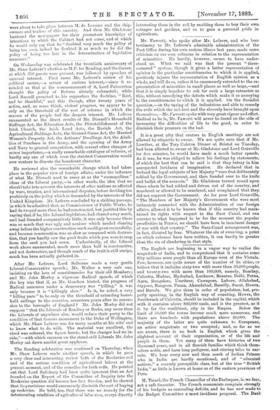It is a great pity that orators in English meetings
are not allowed by etiquette to swear. We are quite sure that if Mr. Lowther, at the Tory Colston Dinner at Bristol on Tuesday, had been allowed to swear at Mr. Gladstone and Lord Granville for five minutes, he would have made a much better speech As it was, he was obliged to relieve his feelings by statements, of which the best that can be said is that they betray in him unexpected luridness of imagination. He declared that in Ireland the loyal subjects of her Majesty " were first deliberately robbed by the Government, and then handed over to the knife and bullet of the assassin." Mr. Gladstone turned round upon those whom he had robbed and driven out of the country, and murdered or allowed to be murdered, and complained that they did not support the Government. As for poor Lord Granville, " The Members of her Majesty's Government who were most intimately connected with the Administration of our foreign affairs, allowed it to be known that if this country had main- tained its rights with respect to the Suez Canal, and run counter to what happened to be for the moment the popular proclivities in France, we should have been in imminent danger of war with that country." The Suez-Canal arrangement was, in fact, dictated by fear. Whatever the sin of swearing, a point- on which volumes have been written, it can hardly be greater than the sin of slandering in that style.


































 Previous page
Previous page